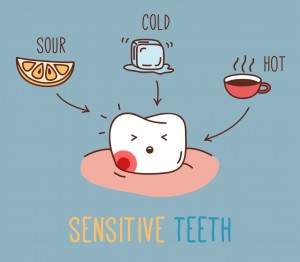Sensitivity of teeth comes with chronic pain and discomfort. This takes place when your teeth get too much exposure to hot and cold. Also referred to as dentin hypersensitivity, sensitivity of teeth is a condition wherein your dentin and its surrounding nerves experience excessive exposure to something cold or hot.
You can sense tooth sensitivity if each time you chew, you feel slight sting of pain, or even by simply breathing through your mouth. Tooth sensitivity can occur due to a number of reasons. Regardless, this condition only happens if your tooth enamel puts up with a dental irregularity. As we all know, tooth enamel is the protective layer of our dentin and its surrounding nerves. Imagine if this layer gets damaged and compromised. Dentin and essential nerves lose the protective barriers.
Tooth enamel usually gets compromised when you suffer from dental problems, such as tooth decay, cavities and gum disease. These dental issues crop up when your teeth put up with excessive levels of dental plaques, a mass of bacteria that form on your teeth. Other factors that cause tooth sensitivity are dental plaque build-up on the root surfaces, damaged dental fillings, cracked or broken teeth and excessive brushing. Individuals who think aggressive brushing is fine should learn that it isn’t. Aside from aggravating your teeth, this routine can damage the enamel. Studies show that intense brushing of teeth can make your tooth enamel thin and exposed to damages.
An existing dental condition also triggers sensitivity of teeth. The most common type of dental problem that sets off sensitivity is bruxism. Bruxism is a form of bite problem. It unconsciously makes you clench or grind your teeth. Teeth clenching involves force and pressure that can result to breakage of teeth. You can prevent this to happen through oral appliances. Mouth guards and night guards are typical oral appliances found in emergency dental offices. You can use this against grinding or clenching of teeth. Mouth guards are fit for outdoor activities. At night especially when sleeping, you can make use of night guards.
Besides applying extra effort of preventing accidents, there are keys to prevent knocked out tooth. Preventive tips include using soft-bristled toothbrushes. Toothbrushes that have soft bristles don’t irritate and harm your teeth and gums. In fact, the material ensures proper cleaning without infuriating your mouth. If you think you can’t brush properly, you can opt for electric toothbrushes. Electric toothbrushes include a timer that beeps when you are excessively brushing your teeth. To achieve protection completely, consider regular dental visits. Regular dental visits help you monitor your oral health. Your dentist will conduct oral screenings which can help you prevent the potential risks of dental problems, including the things that might cause sensitivity.
Dental care is the most vital method to use against sensitivity. This preventive method necessitates you to perform all good oral hygiene strategies at home and inside your dentist’s office. Besides learning dental care, visiting your dentist helps you discover the ways of preventing sensitivity.